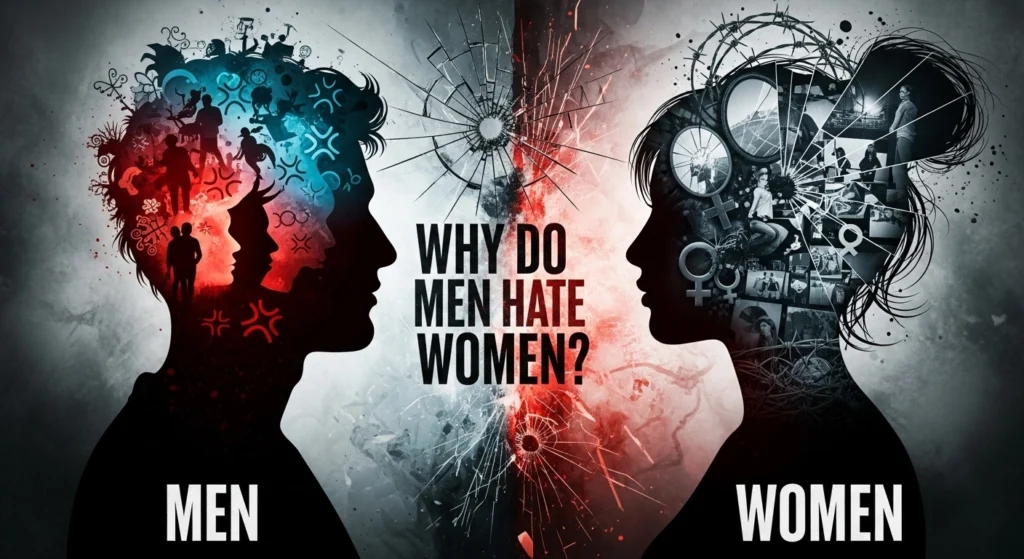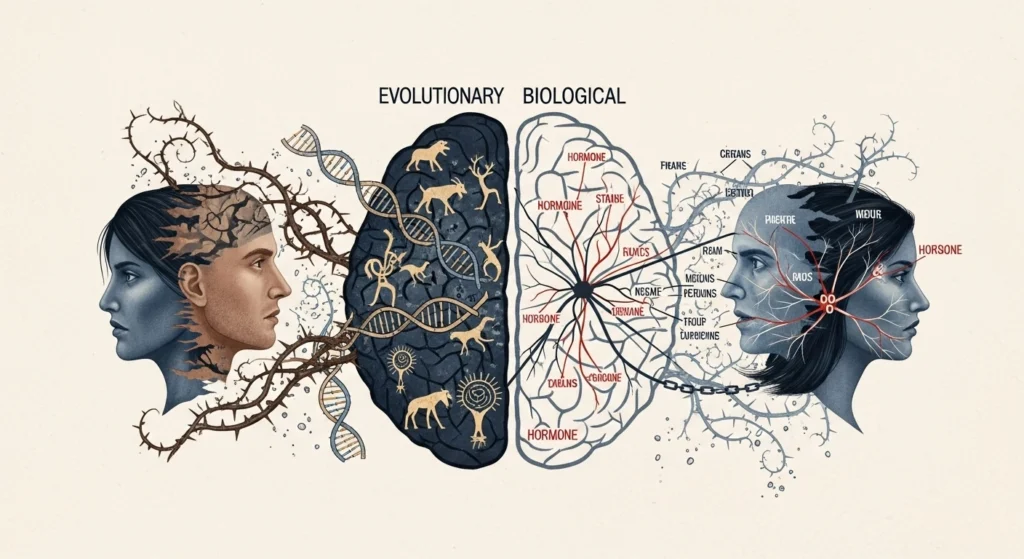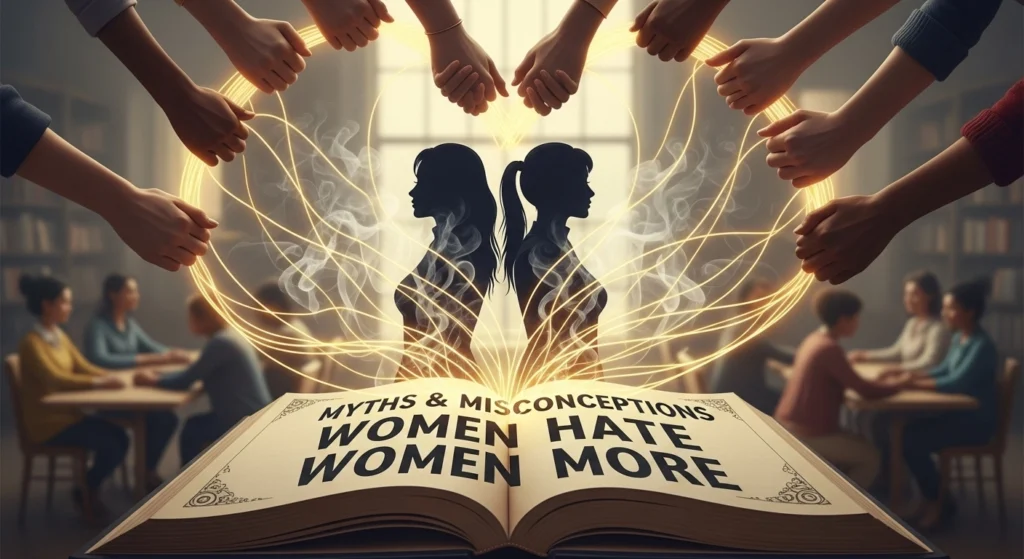Some people ask, “Why do some men hate women?” It’s a hard question, but not all men feel this way. When a man hates or looks down on women, it’s called misogyny. This hate can come from many places, like fear, pain, or things they learned when they were young. I remember learning about this in college, and it really opened my eyes. Sometimes, hate doesn’t start with anger—it starts with hurt feelings that never got healed.
Many boys are taught to always be strong and never cry. They grow up thinking they must be the boss or always in control. But when women speak up or do better, some men feel scared or confused. Instead of dealing with their feelings, they blame women. I’ve met people like this—they didn’t even know their behavior was wrong until someone showed them.
It’s important to learn why some men think or act this way. Misogyny can show up in small ways, like rude jokes, or in bigger ways, like being mean or even violent. But if we understand the real reason behind it, we can help stop it. Learning about this helps us make better choices, teach others, and create a kinder, safer world.

What Is Misogyny?
Misogyny means hating or not liking women. It’s when someone treats women badly just because they are women. This can be loud and mean, like calling girls bad names. But it can also be quiet, like ignoring a girl’s ideas or not giving her the same chance as a boy. I once heard a boy say girls shouldn’t play sports—that’s a small example, but it shows how this thinking starts.
Misogyny vs. Sexism
Sexism is when people think boys are better than girls. It’s unfair, but it’s not always mean. Misogyny is stronger—it’s full of hate or disrespect toward women. For example, if someone says “girls can’t be leaders,” that’s sexism. But if someone says “women are useless,” that’s misogyny. Both are wrong, but misogyny causes more harm.
Forms of Misogynistic Behavior
Misogyny can happen in many ways. A man might talk over a woman in a meeting. A boy might laugh at a girl just for being smart. I once saw a woman share a great idea at work, but no one listened—until a man repeated it. That’s how unfair things can be.
There are two main types. Personal misogyny is when one person acts this way. Structural misogyny is when rules or systems are unfair to women—like when women don’t get equal pay or chances to lead. Both types hurt women and make life harder for them.
Psychological Roots of Misogyny
Childhood Trauma and Maternal Relationships
Some boys grow up with pain or bad memories. If a boy had a hard time with his mom—maybe she was mean, left him, or didn’t care for him—he might feel hurt inside. Later in life, he might start to dislike women without fully knowing why. In one class I took, we talked about how some men carry that hurt into adulthood. That pain can turn into anger or hate if they never deal with it.
Projection of Insecurity
When someone feels weak or not good enough, they sometimes blame others. Some men feel unsure about themselves and take it out on women. This is called projection. It’s like saying, “I feel bad, so I’ll make someone else feel bad too.” I’ve seen this before—men who feel small or afraid sometimes act mean to women to feel strong again.
Narcissism and Control
Some men always want to be in charge. They feel upset when women speak up or do well. They think being strong means never losing control. When they feel like they’re not in control, they get angry. This can lead to hate, because they feel like women are taking power from them—even when they’re not.
Biological and Evolutionary Theories

Dependence on Women for Reproduction
From the very beginning of human life, men have needed women to have children. This is how life goes on. Some scientists say this makes some men feel nervous or out of control. They don’t like feeling weak, so they try to act strong or bossy instead. I learned this in one of my psychology classes, and it really helped me see how fear can sometimes turn into anger.
Power Struggles and Evolutionary Roles
A long time ago, men hunted and protected the family. Women stayed home and took care of the kids. Even today, some people still think this is how it should be. So, when women want to lead or make big decisions, some men feel scared. They may think they’re losing their role, and that fear can lead to fighting for power or treating women unfairly.
Biological Vulnerability and Reproductive Control Anxiety
Some men feel worried when they don’t have control over things like having kids or starting a family. This is called reproductive control anxiety. If a woman makes her own choices—like not wanting children—some men might feel angry or hurt. They may think they are losing control, even if no one is trying to hurt them. This fear, if not handled well, can turn into hate or bad behavior toward women.
Misogyny and Mental Health
Link Between Misogyny and Poor Mental Health
Some men who hate women may also have mental health problems. They might feel very sad, lonely, or angry inside. A study from the National Institutes of Health (NIH) shows that hate like this can come from deep emotional pain. I once joined a class where we talked about how some people deal with their sadness by blaming others—especially women. But blaming doesn’t help. It only hides the real problem.
Escapism Through Violence or Abuse
Sometimes, people who are hurting inside try to escape their feelings. They may drink alcohol, use drugs, or hurt others to feel better for a short time. Some men do this to feel strong, but it often leads to more pain. Experts say that violence and hate are signs of deeper struggles. These men may not know how to talk about their feelings, so they act out instead.
Myths and Misconceptions: “Women Hate Women More”

The “Women Hate Women” Myth
Some people say that women hate other women more than men do. But this idea is not true. Just because you see girls fighting or being mean on TV doesn’t mean it happens all the time. Most women help and support each other. In school and work, I’ve seen many girls work as a team and lift each other up. Yes, girls sometimes argue—but so do boys.
Internalized Misogyny Explained
Internalized misogyny means when a woman believes bad things about other women, even if she doesn’t mean to. This happens when someone grows up hearing that men are better or stronger. So, she may start to treat other girls badly too. I remember a girl in class who used to say, “I don’t like other girls, they’re too much drama.” She wasn’t trying to be mean—she just thought acting like a boy was better.
Real Rivalry vs. Misogyny
It’s normal for people to have fights or feel jealous sometimes. Girls may argue about school, friends, or other things. That doesn’t mean they hate each other. That’s just rivalry, which is common and usually doesn’t last. Misogyny is when someone deeply hates or disrespects women. It’s important to know the difference so we don’t believe false ideas about girls.
Not All Men: Recognizing the Exceptions
Examples of Healthy Male Behavior
It’s important to know that not all men hate women. In fact, many men stand up for women and believe in fairness and respect. These men listen, speak kindly, and treat women as equals. I’ve worked with men who helped create safe spaces for women at work and school. One teacher I had always made sure every voice—boy or girl—was heard. That’s what respectful behavior looks like.
The Role of Education and Empathy
Boys and men can learn to treat women better through education and empathy. When they learn how others feel, they become more kind and fair. Some schools now teach about gender equality, emotions, and kindness. I once saw a young boy in a workshop say, “I didn’t know some jokes could hurt girls.” That moment showed how learning can change hearts. Empathy means understanding someone else’s feelings, and it helps build strong, respectful men.
How to Challenge and Heal Misogyny

Raising Awareness and Educating Boys
To stop hate toward women, we need to start teaching boys when they are young. They should learn that girls are equal and deserve respect. This can happen at school, at home, or even through games and stories. I once helped kids make drawings about kindness, and many boys said they never thought about how girls feel. That kind of learning really helps.
Importance of Therapy and Self-Reflection
Some men feel angry or think badly about women because of things they learned when they were young. Talking to a therapist can help them understand where these thoughts come from. It also helps them change how they act. I knew someone who went to therapy, and over time, he became more kind and respectful toward women. It made a big difference in his life.
Promoting Gender Equality in Practice
Believing in gender equality means we treat everyone the same—boys and girls. This means letting girls speak, lead, and share ideas. Even small things, like not talking over a girl in class, can help. At work, I always try to listen and give credit when a woman shares a good idea. That’s how we show respect in real life—not just with words, but with actions.
Frequently Asked Questions (FAQs)
Can a misogynist love a woman?
This is a tough question. A misogynist may think he loves a woman, but if he also treats her badly, controls her, or looks down on her, that’s not real love. Love means respect, kindness, and fairness. I once spoke with someone who said they “loved” their partner but also didn’t let her speak in public. That’s not healthy love—it’s control. A man must first respect women to truly love one.
What’s the difference between misogyny and misandry?
Misogyny means hate or strong dislike toward women. Misandry is the same, but it’s hate toward men. Both are wrong and hurt people. But misogyny has been more common in history because many cultures gave men more power than women. Understanding the difference helps us fight both unfair ideas.
How can we detect misogynistic behavior early?
You can often spot misogynistic behavior by looking at how someone talks about or treats women. Do they interrupt women often? Do they say women are “too emotional” or “not smart enough”? These are signs. I’ve noticed people use “jokes” to hide hateful thinking, too. Pay attention to patterns—not just one bad day, but repeated behavior that puts women down.
Can misogyny be unlearned?
Yes, misogyny can be unlearned. People can change if they want to. It takes listening, learning, and sometimes therapy. I’ve seen men grow and become better after realizing their beliefs were wrong. It’s not easy, but with time and effort, respect can replace hate.
Conclusion
Hating women, or misogyny, doesn’t just happen for no reason. It often starts from fear, anger, or old beliefs. Some boys grow up learning that men should be in control, or that women are weak. But the truth is, men and women are equal, and both deserve the same respect. I’ve seen people change when they learn this.
Boys and men can learn to treat girls and women with kindness. It starts with small things—listening, being fair, and showing respect. These actions make a big difference. I’ve tried doing this in my own life, and it helps everyone feel safe and heard.
We can all help end hate by being kind, learning new things, and thinking about how others feel. Empathy means trying to understand someone else’s feelings, and it’s a big part of healing. When we care about each other, we make the world better for everyone.
